The International Cooperative Alliance (ICA) hosted its Global Cooperative Conference in New Delhi, India, in the last week of November, with the theme Cooperatives Build Prosperity For All. The main conference (26-27 November) had four main strategic pillars guiding discussions, with each pillar comprising a keynote speech and panel, plus four parallel sessions.
I Enabling Policy and Entrepreneurial Ecosystems
II Nurturing purposeful leadership
III Reaffirming the Co-operative Identity
IV Shaping a Co-operative Future
Rebecca Harvey and Anca Voinea attended the event and more stories will be published soon. Meanwhile, here’s their summary of the main pillar discussions.
Pillar I: Enabling Policy and Entrepreneurial Ecosystems
While the launch of the International Year of Cooperatives on 25 November brought understandable excitement, the conference still had a focus on problems facing the movement – most pressingly, the need for an environment where co-ops can thrive. On this front, legislators, governments, international organisations and the public all have a role to play, delegates heard.
Dr Ashish Kumar Bhutani, secretary of India’s Ministry of Cooperation, outlined initiatives by the Indian government to facilitate co-operative development, in sectors ranging from dairy and agriculture to banking and technology – and he highlighted how the conference underscored the universal appeal of the co-op model, which facilitates gender equality and economic empowerment, and has the potential to build a resilient and inclusive economy.
“Co-ops are the cornerstone of India’s economic and social fabric,” he said, “and the conference theme Prosperity for All aligns with Prime Minister Narendra Modi’s vision of Sahkar Se Samriddhi, Prosperity through Cooperation … but there is a need to unite and define the future of the co-op movement.”
Dr US Awasthi, managing director, Indian Farmers Fertiliser Cooperative (Iffco) followed with a speech describing how co-operatives are a vital part of India’s history. The establishment of the Ministry of Cooperation demonstrated the government’s commitment to take the co-operative movement “into every nook and corner of the country,” he said.
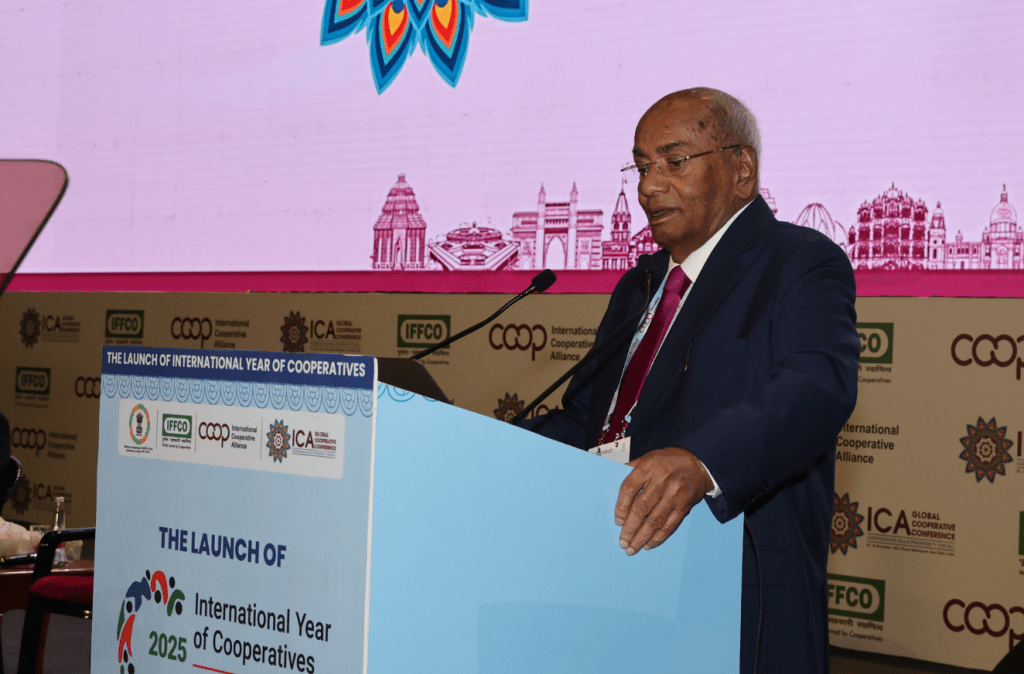
The plenary featured two panels, the first on Conducive Environments for Co-operative Development, the second on Institutional Support for Co-operative Development.
Market policy, tax, the business market and regulation are all aspects that need to be taken into account when it comes to co-ops, delegates heard, while another important aspect is public procurement: many co-ops are small or medium enterprises and have the opportunity to deliver services if the opportunity is there.
There was a recognition that many of the issues faced by co-ops are common to the whole movement – such as the ability to raise capital while protecting co-operative values and principles. But it was also acknowledged that a one-size-fits-all approach to such issues isn’t always suitable. Legal structures for recognition and support vary widely around the world – but the recognition by the UN that laws to support sustainable development are necessary is a positive step.
Principle 6 – co-operation among co-operatives – was also seen as vital in supporting newly emerging policy and entrepreneurial environments.
Following the plenaries, discussions ranged from how to position co-operatives in global policy and cross-regional co-operation to the challenges of transitioning from the informal to formal economy and the role of the state in co-operative development.
Wenyan Yang, chief of the UN Department of Economic and Social Affairs (UNDESA), described how co-ops need support if they are to grow and be successful, and state regulations and laws must be put in place to ensure this.
Pillar II: Nurturing purposeful leadership
The co-op movement needs business-savvy and inspiring leaders if it is to grow stronger: so how can those leaders be supported? Before delving into this topic, delegates heard from Revant Himatsingka – aka the Food Pharmer, a health coach and advocate for better food.
Himatsingka described his campaign Label Padhega India, which focuses on improving health literacy by educating people on the importance of reading food labels. He hopes this will prompt the food industry to provide better quality food, market more honestly and make consumers aware of what they are consuming.
Food labels in India are written in English, he said, which means that only 15% of people can understand them. While his campaign has led to companies suing him, Himatsingka says his motto is “If you send me a legal notice, I will make you publicly noticed.”
The discussions that followed focused on leadership from an individual perspective, exploring how to build leaders for the co-operative movement.
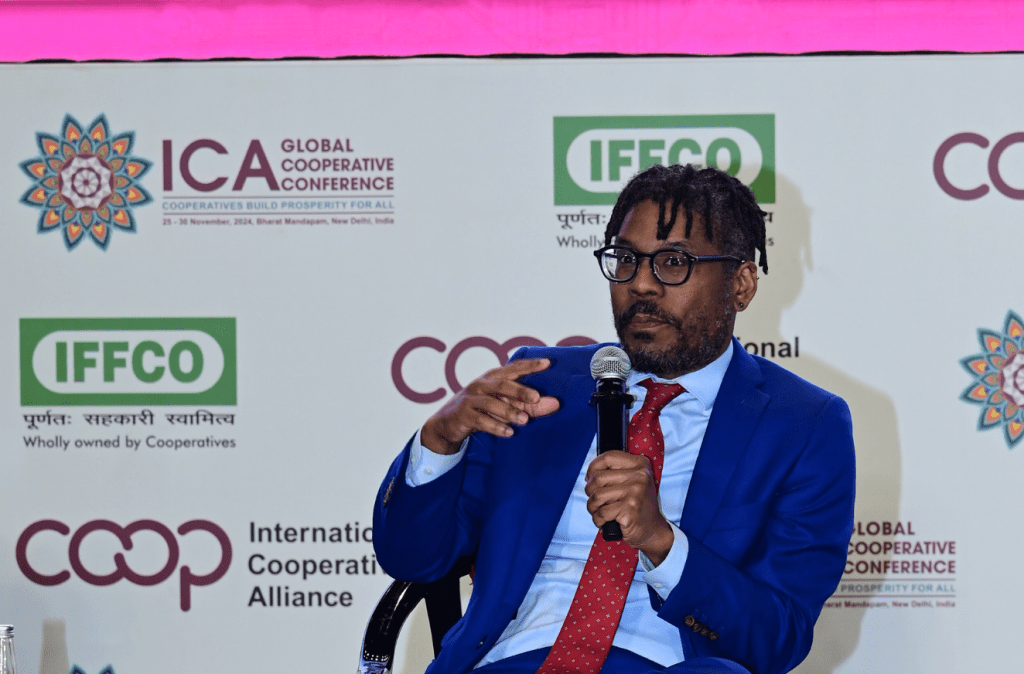
One thing all speakers agreed on was the need to ensure young people have the necessary social and financial skills to navigate the future and become leaders who can negotiate an uncertain future. On this front, co-operatives can help, delegates heard.
But, warned the US Federation of Worker Cooperatives’ Esteban Kelly: “We can’t be hostile to innovation, or people that are new or young and raise issues about organisational culture.”
Dulce Bustamante, chair of the ICA Asia Pacific Committee on Youth Cooperation, spoke about the need to raise awareness of co-operatives among young people, in order to ensure co-op leaders of the future. In the Philippines, some co-ops are already doing this through saving and credit school co-ops, which offer youngsters the chance learn financial skills. Many stay with the organisation, she said.
“What we need is your trust and your commitment to youth development,” she added. “Please consider youth as an investment. Do you gain from your investment overnight?
“Make them feel included, make them feel their opinions matter. Consider them for your leadership positions, for your board. We are building a better future. We are nurturing our future leaders. We must not treat young people as threats. We must treat them as an investment, we must let them grow.”
Delegates were advised to give young people the opportunity to get involved, because this is how they learn to lead.
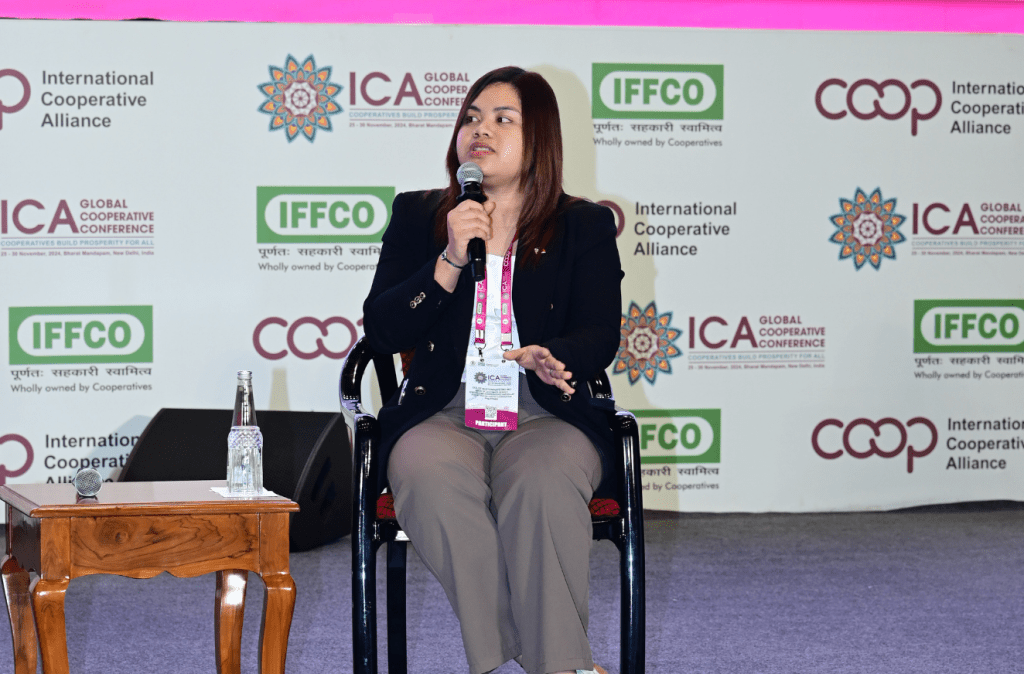
The second panel explored how co-operatives are leading the way to Shared and Sustainable Prosperity.
Pete Westall (chief values officer at Midcounties Co-operative) described how consumer co-ops in the UK aim to not just “be in the game” but to actually change the game. Midcounties – whose business portfolio includes nurseries – is working with other co-operatives, Co-op Party MPs and Co-operatives UK to change government policy on childcare.
He also spoke about Midcounties’ values of democracy, openness, social responsibility and equality, and its Our Doing Good Together Fund, which allows members to support causes they care about.
Quality messaging is also vital, said Westall, pointing to the work of other UK co-ops – such as the Co-op Group’s Owned by You, Right by You campaign and Central Co-op’s work to communicate its values to employees.
The importance of co-operatives helping other co-ops achieve prosperity was highlighted by Mirai Chatterjee, chair of India’s Sewa Cooperative Federation, while Dr Nelson Kuria, chair of CIC Group, Kenya, shared how co-ops can grow, scale up and compete with the biggest corporations if they are given the right enabling environment and cross-sectoral support.
Pillar III: Reaffirming the Cooperative Identity
The 33rd World Cooperative Congress in Seoul, with the theme Deepening Our Cooperative Identity, initiated a consultative process to explore co-operators’ understanding of the statement and to examine how well it has stood the test of time.
The ICA Global Cooperative Conference served to further discuss how to reaffirm the cooperative identity, using insights from the consultation.
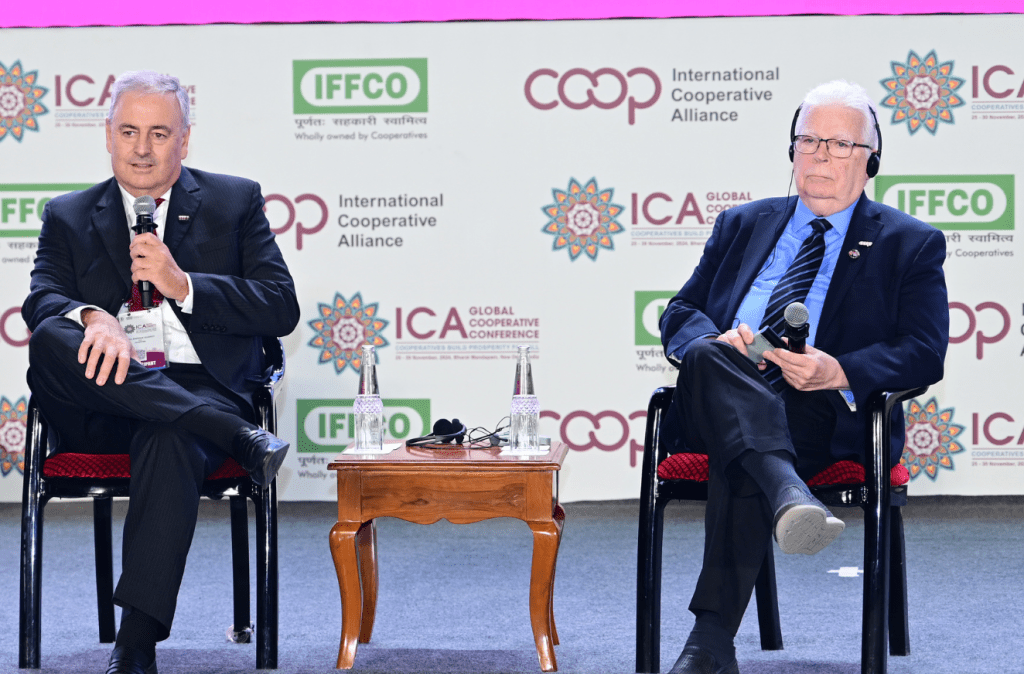
ICA president Ariel Guarco set the scene by announcing the release of his book Cooperatives in Action: Enterprises with Principles and Values that Change the World.
Martin Lowery, former chair of the ICA Board Committee on the Cooperative Identity and author of the book’s forward, told delegates: “The co-op values are more important now that ever before, particularly with the number of conflicts taking place around the world.”
The plenary address was by the youngest speaker of the week, Kendra Pristin, a 10-year old co-operator on the Aflatoun-NATTCO programme, run by DCCO Youth zone laboratory co-op in the Philippines. The programme empowers young people by promoting social and financial skills to help them build their own sustainable future.
The programme visits schools and runs savings schemes. “We are not rich, we live a simple life,” said Pristin. “Since becoming a member I have been saving a lot and this year I was the top depositor in my school.
“Through the programme I learnt how to be part of a team and how decisions can be made at a young age . It’s fun to participate with fellow youth and see how together people can help make a difference.
“I have a long journey ahead but I am not afraid of the challenges, because my family and my co-op will be here to help me and guide me.”
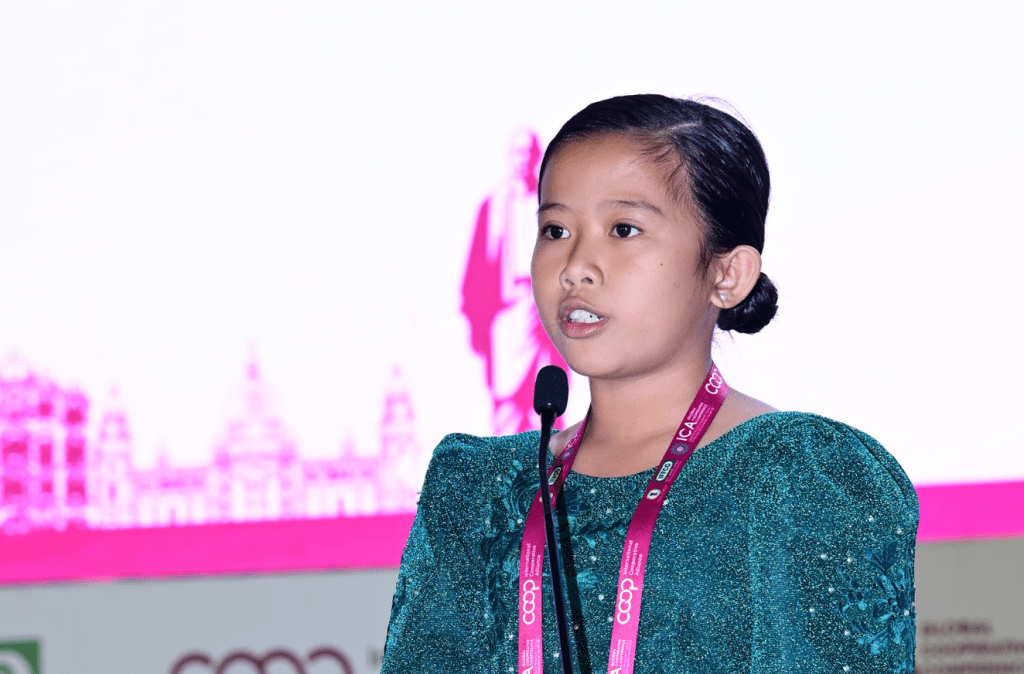
During a panel discussion, Alexandra Wilson, ICA board Member and chair of the ICA’s Co-operative Identity Advisory Group, shared Perspectives from ICA Global Consultations on the Cooperative Identity. Canada’s experience, she said, was that co-operators who joined in the consultation discussions were interested and engaged.
The panel featured co-operators from different regions, who shared their vision of the co-operative identity. But once we are sure of our co-operative identity, how do we live our co-operative identity?
This was the question posed to a panel moderated by Melina Morrison, CEO of Australia’s Business Council of Cooperatives and Mutuals. “We need to look at the practical implementation of these ideas,“ she said, “why we’re engaging and why we care so much to go through this [consultation] process.”
Morrison stressed the urgency of the co-operative identity – and not just because the movement is nearing the International Year. The crucial task remains of advocating co-ops as the greatest tool the world possesses to address its multiple crises.
Why should we care to ask the questions? Morrison asked. The answer, she said, was because “we want get this right, we want to improve … We can get better at sharing our identity this is our challenge and opportunity.”
With 3 million co-operatives living their co-op identity in 3 million different ways, “We need to be muscular and approach the IYC 2025 with a sense of urgency,” added Morrison.
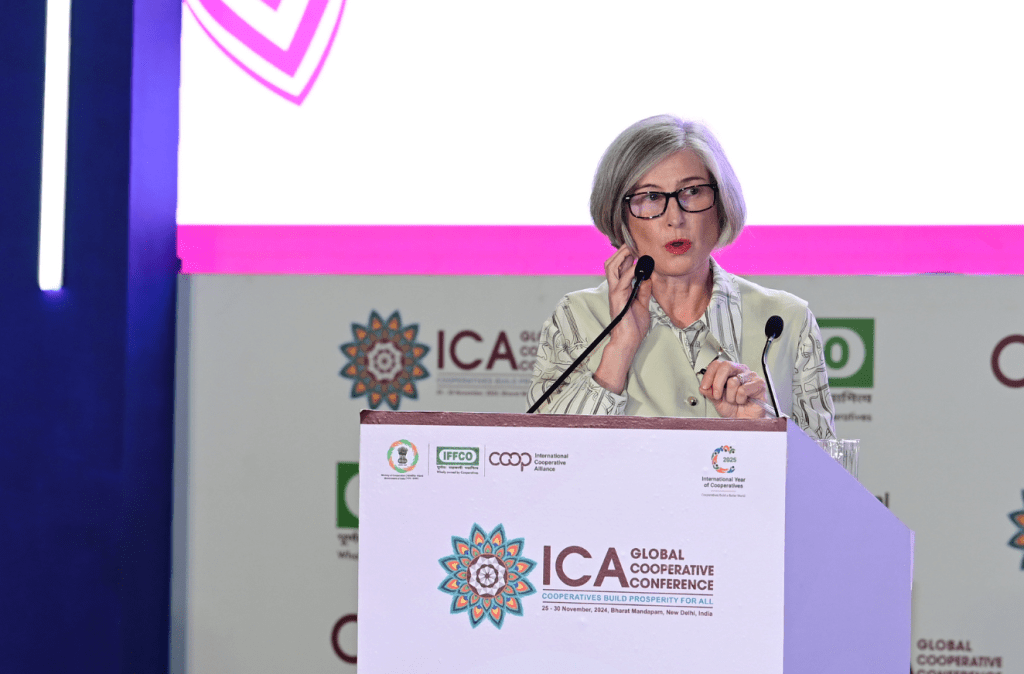
Pillar IV: Shaping a Cooperative Future
In a rapidly changing world, co-ops can harness digitalisation to create new collaborations, economic and market benefits, alternative business models and educational opportunities.
The conference highlighted some of these initiatives, shedding light on co-operatives’ role in creating urgent digital solutions.
Cory Efram Doctorow, best-selling author of The Internet Con: How to Seize the Means of Computation, had some tips for delegates in his keynote address. Co-ops can seize the means of computation, he said, describing a pattern in which online products and services decline in qualities, a pattern he calls “Enshittification.”
He explained that once users are locked on to the platform, the platform can mistreat them.
“These platforms used to be better and now they are worse,” he said. “And they were always digital and they were always greedy.”
This may well be wearily familiar to social media users around the world – but, said Doctorow, co-ops offer hope, as they incentivise resistance. “Co-ops should be idea brokers between producers and consumers and they need to be able to reach one another.”
Data is also important in terms of creating and measuring co-operative impact, and thus to making the case for enabling co-operative frameworks and policies.
In a session moderated by Sonja Novkovic, professor of economics and academic director of the International Centre for Co-operative Management at Saint Mary’s University, Canada, delegates heard about solutions such as platform co-ops from Trebor Scholz, founding director of the Platform Cooperativism Consortium, which can help shape a co-operative future. The session also looked at how co-operatives are “the heart and the soul of Fairtrade” by bringing together small scale farmers in groups, which provides a platform for meaningful dialogue and gives Fairtrade the opportunity to support food producers and provide training.
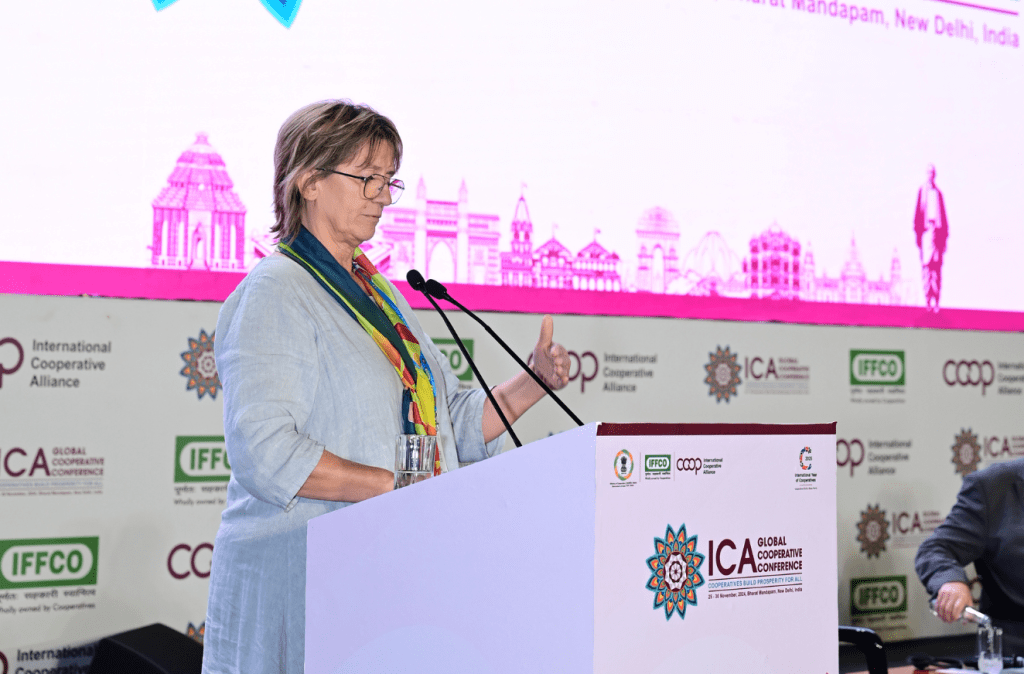
Chiyoge Sifa talked about CoopStar (Cooperatives for Sustainable Transformation in Africa), a project to boost sustainable and transformational co-operative entrepreneurship in Africa, while Simel Esim, manager of the International Labour Organization’s Cooperative, Social and Solidarity Economy Unit, explained the ILO’s role as a standard-setting institution, particularly in terms of statistics.
The ILO, along with he Committee for the Promotion and Advancement of Cooperatives (Copac), carried out four studies which were used to develop guidelines on statistics on co-operatives. These guidelines were used for pilot projects in different countries. The findings from these will be used to develop a co-op manual.
“Without research and education we are not going to go far,” warned Novkovic. “We need to be authentically educated as well.”
The final plenary panel of the week was moderated by ICA director general Jeroen Douglas, and showcased some of the market based co-operative solutions that have evolved.
Rose Marley, CEO, Co-operatives UK, shared what she believed is the future of co-operation, mentioning Equal Care Co-op, a platform co-operative that uses technology to reduce administrative burdens. “They’ve got happy workers who are paid well,” she said, adding that co-operatives need to get better at telling their stories.
Shatadru Chattopadhyay, from Solidaridad Network Asia, urged co-operatives to be better at driving sustainability, and Violetta Nafpaktiti described Dotcoop’s work verifying .coop domains.
The plenary was followed by entertainment – with a demonstration of dance traditions from Padma Shri Dr Aruna Mohanty & Team Orissa Dance Academy. The performance paid tribute to the Odissi, Kathak, Bharatnatyam, Manipuri (Pungcholam), contemporary, martial arts, Mohiniattam and folk traditions from various parts of India.